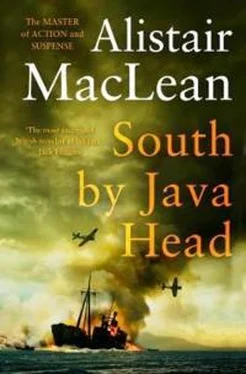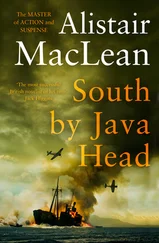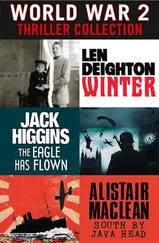“A bit early to start counting your chickens yet, Willy,” Nicolson said warningly.
“What do you mean?”
It was Farnholme who replied, his voice sharp. “Just that rain-clouds don’t necessarily mean rain, that’s all.”
Nicolson spoke as soothingly as he could. “Not at first, that is.”
“Do you mean to tell me, young man, that we’ll be no better of than we were before?” There was only one person on the boat who addressed Nicolson as ‘young man.’
“Of course not, Miss Plenderleith. These clouds look thick and heavy, and it’ll mean shelter from the sun, for one thing. But what the captain and I are really interested in is the wind. If it picks up and holds we can reach the Sunda Straits sometime during the night.”
“Then why haven’t you let the sails rip?” Farnholme demanded.
“Because I think the chances are that we will have rain,” Nicolson said patiently. “We’ve got to have something to funnel the water into cups or baler or whatever we use. And there’s not enough wind yet to move us a couple of feet a minute.”
For the better part of an hour after that nobody spoke. With the realisation that salvation wasn’t as immediate as they had thought, some of the earlier listlessness had returned. But only some. The hope was there, and none of them had any intention of letting it go. No one closed his eyes or went to sleep again.
The cloud was still there, off the starboard beam, getting bigger and darker all the time, and it had all their attention. Their gaze was on that and on nothing else and maybe that was why they didn’t see Sinclair until it was too late.
It was Gudrun Drachmann who saw him first, and what she saw made her rise as quickly as she could and stumble for’ard towards the boy. His eyes upturned in his head so that his pupils had vanished and only the whites were visible, he was jerking convulsively in his seat, his teeth chattering violently like a man in an ague and his face was the colour of stone. Even as the girl reached him, calling his name softly, beseechingly, he pushed himself to his feet, struck at her so that she stumbled and fell against the brigadier, and then, before anyone had time to recover and do anything, tore off his shirt, flung it at the advancing Nicolson and jumped overboard, landing flat-faced with a splash that sent water spattering all over the boat.
For a few seconds no one moved. It had been all so swift and unexpected that they could have imagined it. But there was no imagination about the empty thwart in the boat, the spreading ripples on the glassy surface of the sea.
Nicolson stood motionless, arrested in mid-step, the ragged shirt caught in one hand. The girl was still leaning against Farnholme, saying ‘Alex’, ‘Alex’, over and over again, meaninglessly. And then there came another splash from right aft, not so loud this time. The bo’sun had gone after him.
The second splash brought Nicolson back to life and action with a perceptible jerk. Stooping quickly, he caught hold of the boat-hook and turned quickly to the side of the boat, kneeling on the bench. Almost without thinking he had dragged his pistol from his belt and was holding it in his free hand. The boat-hook was for McKinnon, the pistol for the young soldier. The panic-stricken grip of a drowning man was bad enough: God only knew what that of a drowning madman might be like.
Sinclair was thrashing about the water about twenty feet from the boat and McKinnon, just surfaced, was splashing determinedly towards him – like nearly all Islanders, swimming was not one of his better accomplishments – when Nicolson caught sight of something that struck at him like an ice-cold chill. He swung the boat-hook in a wide curving arc that brought it crashing into the water only inches from McKinnon’s shoulder. Instinctively the Bo’sun caught hold of it and twisted round, his dark face a mass of startled incomprehension.
“Back, man, back!” Nicolson shouted. Even in that moment of near-panic he could hear that his voice was hoarse and cracked. “For God’s sake, hurry up!”
McKinnon started to move slowly towards the boat, but not of his own volition; he still held on to the boat-hook, and Nicolson was drawing it quickly inboard.
McKinnon’s face still had its almost comical expression of bewilderment. He looked over his shoulder to where Sinclair was still splashing aimlessly around, more than thirty feet away now, looked back again towards the boat, opened his mouth to speak and then shouted aloud with pain. A split second passed, he shouted again, and then, mysteriously galvanised into furious activity, splashed his way madly towards the boat. Five frantic strokes and he was alongside, half-a-dozen hands dragging him head-first into the boat. He landed face down on a cross-seat, and, just as his legs came inboard, a greyish, reptilian shape released its grip on his calf and slid back soundlessly into the water.
“What – what on earth was that?” Gudrun had caught a glimpse of the vicious teeth, the evil snake’s body. Her voice was shaking.
“Barracuda,” Nicolson said tonelessly. He carefully avoided looking at her face.
“Barracuda!” The shocked whisper left no doubt but that she had heard all about them, the most voracious killers in the sea. “But Alex! Alex! He’s out there! We must help him, quickly!”
“There’s nothing we can do.” He hadn’t meant to speak so harshly, but the knowledge of his utter powerlessness affected him more than he knew. “There’s nothing anyone can do for him now.”
Even as he was speaking, Sinclair’s agonised scream came at them across the water. It was a frightening sound, half-human, half-animal, and it came again and again, strident with some nameless terror, as he flung himself convulsively about, at times rising half-clear of the sea and arching so far back that his hair almost touched the water, his hands churning foam as he beat insanely at some invisible enemies. The Colt in Nicolson’s hand crashed six times in rapid succession, kicking up gouts of flying water and spray around the soldier, quick, unsighted shots that could never have hoped to accomplish anything. Careless, almost, one might have called them, all except the first: there had been nothing careless about that shot, it had taken Sinclair cleanly through the head. Long before the smell of cordite and blue wisps of smoke had drifted away to the south, the water was calm again and Sinclair had vanished, lost to sight beneath the steel-blue mirror of the sea.
Twenty minutes later that sea was no longer blue but churned to a milky, frothing white as the sheets of driving torrential rain swept across it from horizon to horizon.
Close on three hours had passed, and it was about the time of sundown. It was impossible to see the sun, to know where it was, for the rain-squalls still marched successively south and in the failing light the sky was the same leaden grey at all points of the compass. The rain still fell, still swept across the unprotected boat, but nobody cared. Drenched to the skin, shivering often in the cold rain that moulded and plastered thin cottons to arms and bodies and legs, they were happy. In spite of the sudden, numbing shock the death of Sinclair had given them, in spite of the realisation of the tragic futility of his death with the life-giving rain so near at hand, in spite of these things they were happy. They were happy because the law of self-preservation still yielded place to none. They were happy because they had slaked their terrible thirsts and drunk their fill, and more than their fill, because the cold rain cooled down their burns and blistered skins, because they had managed to funnel over four gallons of fresh rain-water into one of the tanks. They were happy because the lifeboat, driven by the spanking breeze, had already covered many of the miles that stretched between where they had lain becalmed and the now steadily nearing coast of Western Java. And they were deliriously happy, happier than they had dreamed that they could ever be again, because salvation was at hand, because miracles still happened and their troubles were over at last.
Читать дальше
Конец ознакомительного отрывка
Купить книгу










